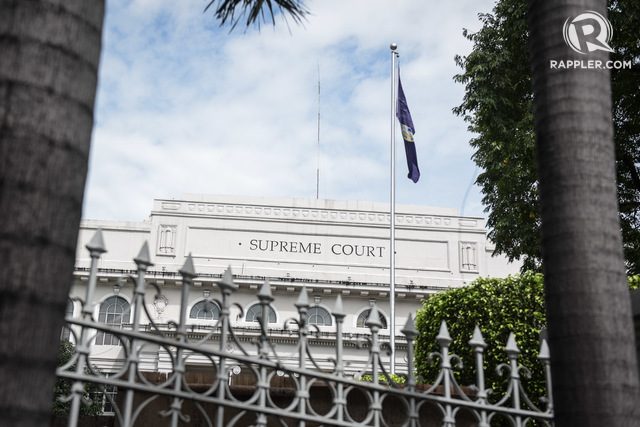SUMMARY
This is AI generated summarization, which may have errors. For context, always refer to the full article.

MANILA, Philippines – The Supreme Court (SC) denied the petition of farmers and fisherfolk from Samar who wanted to stop the awarding of contracts for 6 airports across the country, which they alleged to be unconstitutional for restraining free trade and allowing monopolies.
The group GIOS-SAMAR, which identified themselves as among the victims of Super Typhoon Yolanda, went to the High Court using the doctrine of transcendental importance to argue that they have a stake as taxpayers to stop the project.
The SC en banc denied the petition mainly because of violation of hierarchy of courts, saying that they are not a trier of facts.
“To end, while reflective deliberation is necessary in the judicial process, there is simply no ample time for it given this Court’s massive case load,” said the en banc in a decision promulgated March 12, but seen by media only on Thursday, March 28.
The decision was unanimous and was written by Associate Justice Francis Jardeleza.
In a column in the Manila Bulletin, retired Supreme Court Justice Arturo Brion wrote that how the case was decided shows a “filtration approach” to lessen the court’s case load.
“Drawing lessons from the case, the court likewise sent the litigating public and the members of the Bar a very clear message: respect the rule on hierarchy of courts as it would no longer allow the commonly claimed ‘transcendental importance’ of the issues raised to serve as basis to secure the court’s direct intervention,” Brion wrote.
What is the issue? The group argued that the bundling of contracts for different airports was unconstitutional, since “it will surely perpetrate an undue restraint of trade.”
What was then called the Department of Transportation and Communications (DOTC) – now the Department of Transportation (DOTr) – and its attached agency Civil Aviation Authority of the Philippines (CAAP) posted in December 2014 the invitation to bid for contracts for development, operations and maintenance of the following airports:
- Bacolod-Silay
- Davao
- Iloilo
- Laguindingan
- New Bohol
- Puerto Princesa
The government bundled the contracts so Bacolod and Iloilo became Bundle 1 and Davao, Laguindingan, and New Bohol became Bundle 2. Puerto Princesa was not part of a bundle.
Bidders could go for one bundle or both. The overall project cost was P116.23 billion.
The petitioners said that for one, bundling gave questionable firms the opportunity to join a consortium and directly bid.
On the other hand, legitimate medium-sized companies, petitioners said, were effectively excluded from the bid because they wouldn’t have the financial capability to bid for what became big projects because of the bundling.
Petitioners also said the bundling violated Section 19, Article XII of the Constitution which required the government to regulate or prohibit monopolies when public interest requires.
What did the Supreme Court say? The SC dismissed the petition mainly because the justices believe the petitioners should have brought the case to a tribunal that has the competence to try commercial disputes.
In its 42-page decision, the en banc passed upon the definitions of the law invoked in the petition such as the Anti-Dummy Law and Commonwealth Act No. 108. But ultimately the Court said it would need evidence to be able to assess if such laws were violated.
“The allegation that bundling is in grave abuse of discretion is a conclusion of law. As shown, no facts were even alleged to show which specific law was violated by the decision to bundle the Projects,” the en banc said.
The case is among the many examples of cases being filed before the Supreme Court by individuals not directly affected by a government policy, but who use the doctrine of transcendental importance.
The last part of the ponencia can be read as a warning to similar case filers: “The Court will refuse to resolve the question regardless of the allegation or invocation of compelling reasons, such as the transcendental or paramount importance of the case.”
“The Bersamin Court has spoken in a clear and loud voice of the approach it shall henceforth strictly follow in litigations before the court. Indeed both the public and the court itself must toe this line to achieve the prompt disposition of cases that the public seeks,” Brion said. – Rappler.com
Add a comment
How does this make you feel?
There are no comments yet. Add your comment to start the conversation.